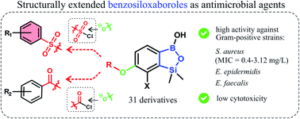We are very pleased to introduce Sergiusz Luliński, corresponding author of the paper ‘Development of structurally extended benzosiloxaboroles – synthesis and in vitro biological evaluation‘. His article has been very well received and handpicked by our reviewers and handling editors as one of our HOT articles. Sergiusz told us more about the work that went into this article and what he hopes to achieve in the future. You can find out more about the author and his article below and find more HOT articles in our online collection.
Meet the author
 Prof. Sergiusz Luliński obtained the PhD degree in chemistry from the Warsaw University of Tech-nology in 2001. Since the beginning of his science career, his research interest has concentrated on main group organometallic chemistry. Currently, his work is focused on the chemistry of novel bio-active boracyclic compounds for applications in medicinal chemistry. He is also interested in the design of various organoboron compounds and their use as porous or luminescent materials. He has published 70 research papers in respected chemistry journals.
Prof. Sergiusz Luliński obtained the PhD degree in chemistry from the Warsaw University of Tech-nology in 2001. Since the beginning of his science career, his research interest has concentrated on main group organometallic chemistry. Currently, his work is focused on the chemistry of novel bio-active boracyclic compounds for applications in medicinal chemistry. He is also interested in the design of various organoboron compounds and their use as porous or luminescent materials. He has published 70 research papers in respected chemistry journals.
Could you briefly explain the focus of your article to the non-specialist (in one or two sentences only) and why it is of current interest?
Antimicrobial resistance (AMR) will become the most significant threat that humanity has to face in the coming decades. In our work, we explore a new class of boraheterocycles termed benzosiloxaboroles. They exhibit a large variety of biological activities, which can be exploited in future.
How big an impact could your results potentially have?
This work reports a new family of structurally expanded benzosiloxaboroles with a particular focus on deriva-tives with pendant arylsulfonate groups, which showed the most promising antibacterial activity, especially to-wards various strains of Staphylococcus aureus. In a general sense, our long-term project indicates that ben-zosiloxaboroles are promising antimicrobial agents as well as β-lactams inhibitors.
Could you explain the motivation behind this study?
Clinical strains of methicillin-resistant S. aureus have been a severe problem in hospitals and open treatment for many years. They are resistant to almost all β-lactams and often resistant to other classes of antibiotics. There-fore, it is necessary to search for novel potent antibacterials, preferably featuring a new mechanism of action.
In your opinion, what are the key design considerations for your study?
The key design considerations include the improvement of antibacterial potency of benzosiloxaboroles while simultaneously retaining their low cytotoxicity. In addition, we aim at development of effective methods for preparation of a library benzosiloxaboroles with diverse substitution pattern.
Which part of the work towards this paper proved to be most challenging?
The most tricky part of the project was the optimization of synthetic procedures including preparation of the key ionic intermediate as well as subsequent derivatizations with benzoyl and benzenesulfonyl chlorides as electro-philic partners.
What aspect of your work are you most excited about at the moment?
In our long-term work, we investigate the influence of the substitution of benzosiloxaboroles on biological activi-ty and physicochemical properties. It is exciting that benzenesulfonyl derivatives show such a high activity against S. aureus MRSA strains and enterococci which constitute a serious problem in medicine.
What is the next step? What work is planned?
We will continue the work on organoboron antimicrobial agents. Specifically, we would like to establish the correlation between structure and activity of substituted benzosiloxaboroles.
Development of structurally extended benzosiloxaboroles – synthesis and in vitro biological evaluation
P. Pacholak, J. Krajewska, P. Wińska, J. Dunikowska, U. Gogowska, J. Mierzejewska, K. Durka, K. Woźniak, A. E. Laudy and S. Luliński
RSC Adv., 2021,11, 25104-25121
DOI: 10.1039/D1RA04127D, Paper
 Submit to RSC Advances today! Check out our author guidelines for information on our article types or find out more about the advantages of publishing in a Royal Society of Chemistry journal.
Submit to RSC Advances today! Check out our author guidelines for information on our article types or find out more about the advantages of publishing in a Royal Society of Chemistry journal.
Keep up to date with our latest HOT articles, Reviews, Collections & more by following us on Twitter. You can also keep informed by signing up to our E-Alerts.












